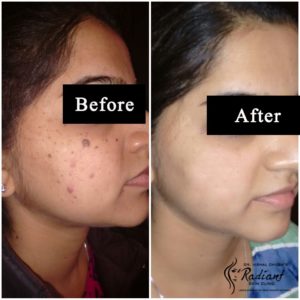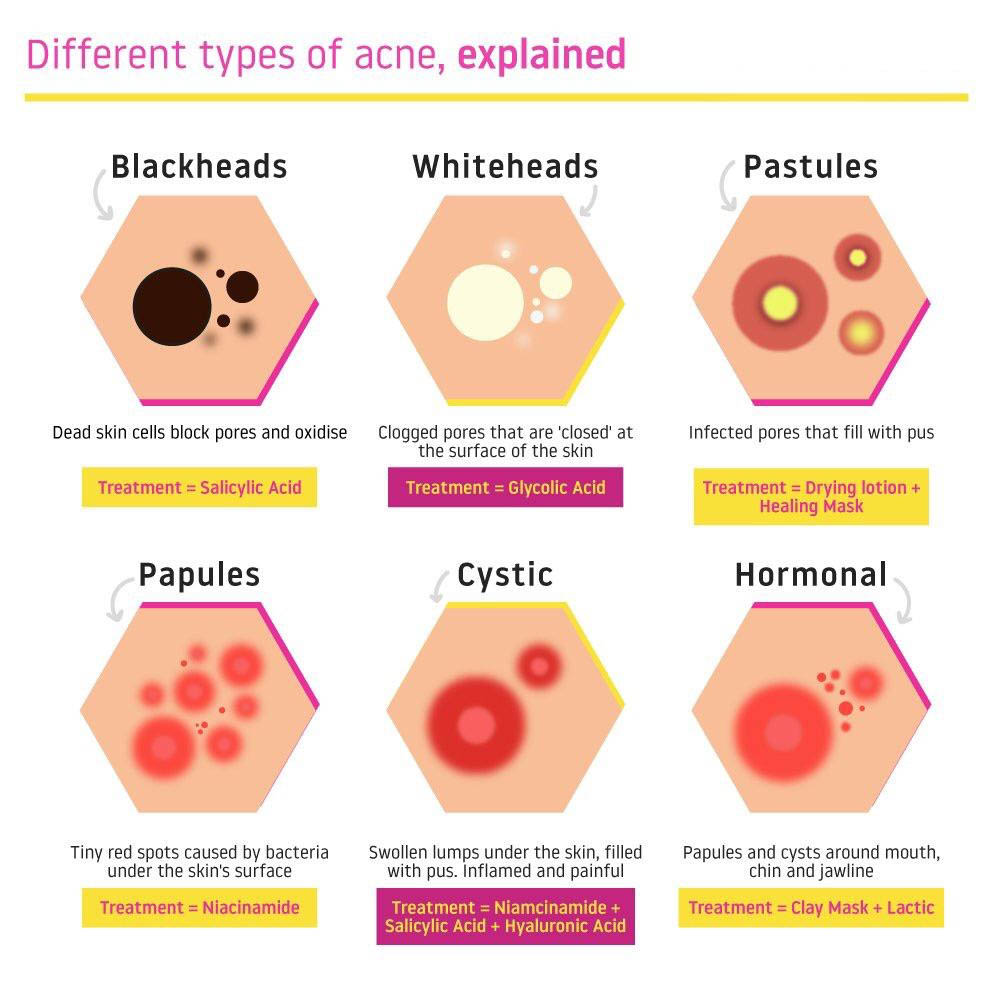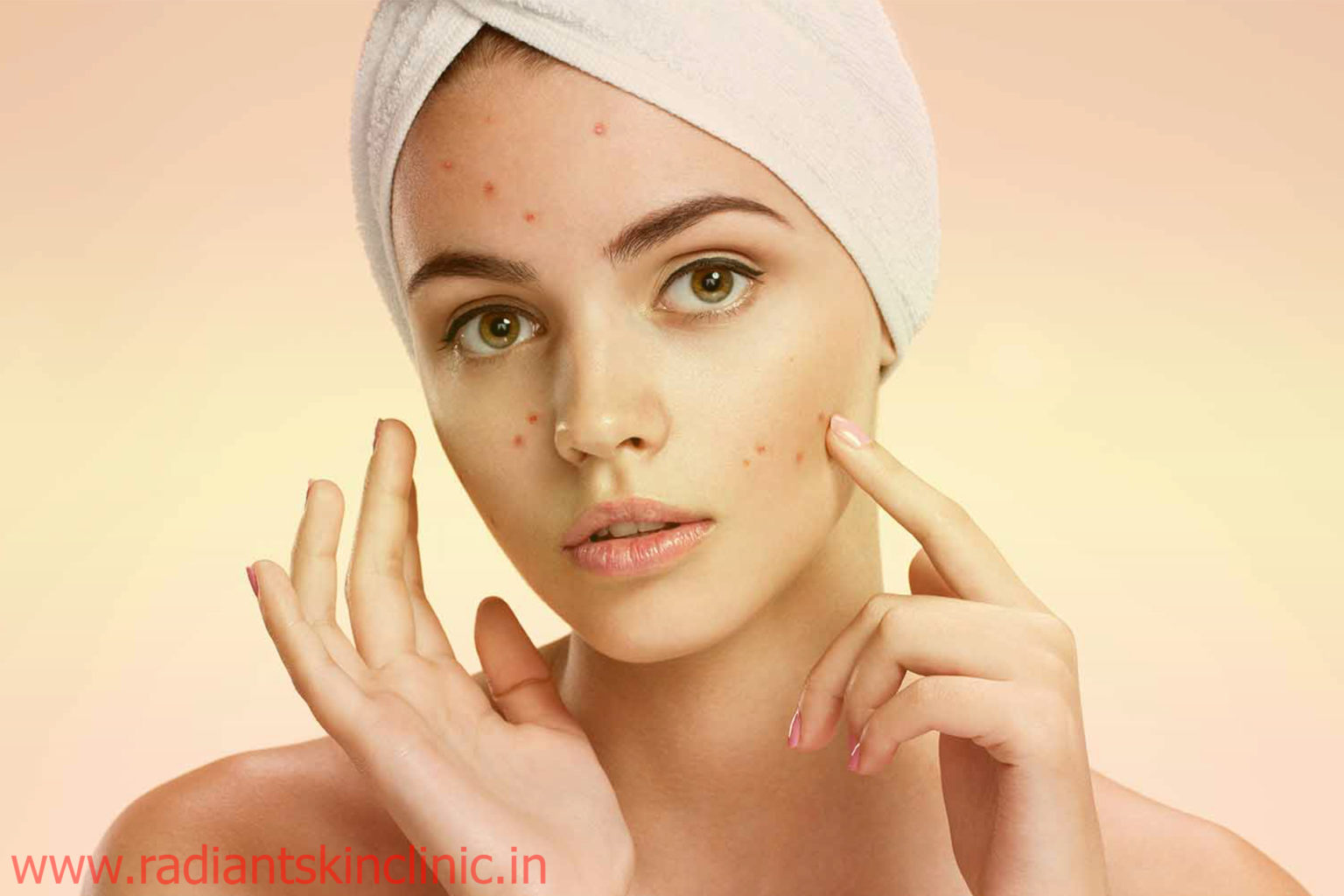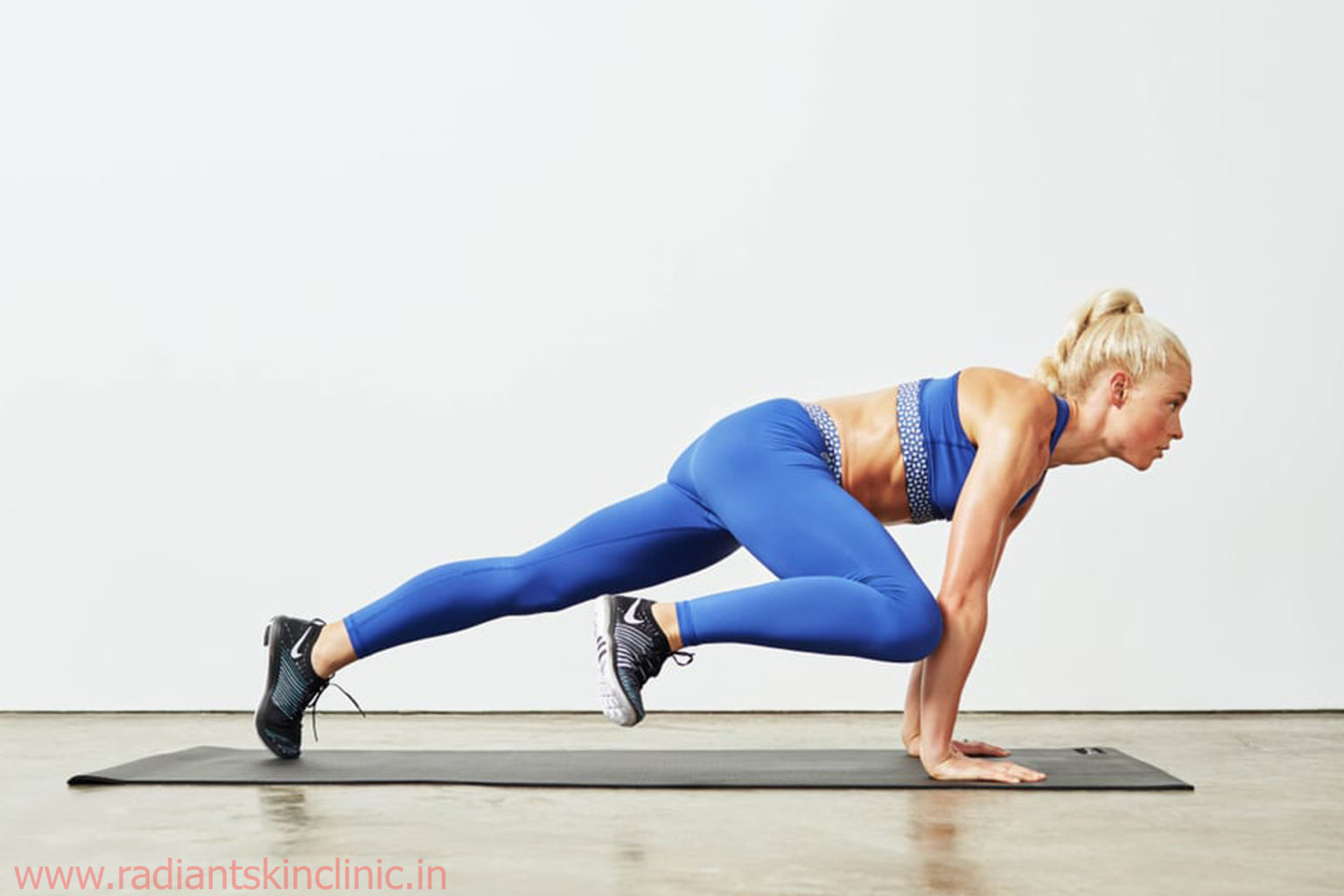What is an Acne?
Acne is a spot that forms on the face, back or the chest. Acne can cause an oily skin along with redness and inflammation of the skin, which can be painful at the same time. The face is affected almost in everyone with acne, the back is affected in more than half the people and in 15% of the people with acne chest is affected. Dr. Vishal Chugh is the Best Dermatologist in Jaipur known for Acne Treatment.
The spots formed by acne are 6 types. These are:
- Blackheads: These are small yellow or blackish bumps on the skin. They are black because of the hair follicle which produces pigmentation.
- Whiteheads: These are similar to blackheads, but firmer and empty when squeezed.
- Papules: These are red bumps usually sore and tender
- Pustules: Very similar to papules, but have some white tip in the center which is due to the pus buildup
- Nodule: These are large bumps under the skin and are painful
- Cysts: These are the most severe form of acne. They are large and pus-filled and bears a close resemblance to the boils. These can cause permanent scarring.
Consulting Dr. Vishal Chugh, the best dermatologist for Acne Treatment in Jaipur will help you to prevent Acne Spots. To Know more about Acne Treatment at Radiant Skin Clinic, click here.
Reasons for Acne?
There are various reasons for acne.
Hormones
The increase in the production of hormones can trigger acne. During puberty, the body produces androgens in excess. Androgen is a male sex hormone that includes testosterone. Testosterone signals the body to produce more sebum that is an oil made in the skin’s oil glands.
Hygiene
It is important to maintain proper hygiene to avoid acne. Not washing your face regularly, sleeping on a pillow with a dirty pillowcase, not cleaning your mobile phone, etc. can cause acne. It is essential to clean all the things that come in contact with your face to avoid acne.
Pollution
The dust and dirt in the surroundings can stick to the pores on your face. This can lead to acne. Ensure you cover your face with a scarf when you go out in the pollution. Also, once you are back home, wash your face with a good cleanser. It is recommended to buy a cleanser or face wash that suits your skin type.
Improper diet
Not having the right nutrients can lead to acne. Maintain a proper diet that is rich in minerals and vitamins. Include plenty of green vegetables, fresh fruits, and dry fruits in your diet. Avoid having oily food as it can trigger acne too.
Less intake of water
It is essential to have 2 liters of water daily. To keep your skin clean and clear, drink plenty of water. Well hydrated skin is a healthy skin.
Acne Treatment
Acne Scars cannot be treated only with the drugs and medicines. At Radiant Skin Clinic different therapies which includes chemical peeling, dermaroller, microdermabrasion and acupulseCO2 laser are available. Treatment is diagnised according to individuals.
How to cure your Acne?
Keep your face clean.
Whether or not you have acne, it’s important to wash your face twice daily to remove impurities, dead skin cells, and extra oil from your skin’s surface. Washing more often than twice daily is not necessarily better; it may do more harm than good. Use warm, not hot, water and a mild facial cleanser. Using a harsh soap (like deodorant body soap) can hurt the already inflamed skin and cause more irritation.
Avoid scrubbing your skin harshly with a washcloth, exfoliating glove, or loofah (a coarse-textured sponge). Gently wash it with your clean hands or a very soft cloth. Always rinse well, and then dry your face with a clean towel. (Toss the towel in the laundry hamper, as dirty towels spread bacteria.)
Moisturize.
Many acne products contain ingredients that dry the skin, so always use a moisturizer that minimizes dryness and skin peeling. Look for “noncomedogenic” on the label, which means it should not cause acne. There are moisturizers made for oily, dry, or combination skin.
Try an over-the-counter acne product.
These acne products don’t need a prescription. They may have ingredients such as benzoyl peroxide, salicylic acid, glycolic acid, or lactic acid, which curb bacteria and dry your skin. Start with a small amount at first. Then you can adjust how much you use and how often, depending on how much peeling or drying you have. Use these products with caution if you have sensitive skin.
Use makeup sparingly.
During a breakout, avoid wearing foundation, powder, or blush. If you do wear makeup, wash it off at the end of the day. If possible, choose oil-free cosmetics without added dyes and chemicals. Choose makeup that is labeled as “noncomedogenic,” meaning it should not cause acne. Read the ingredients list on the product label before buying.
Watch what you put on your hair.
Avoid using fragrances, oils, pomades, or gels on your hair. If they get on your face, they can block your skin’s pores and irritate your skin. Use a gentle shampoo and conditioner. Oily hair can add to the oil on your face, so wash your hair often, especially if you’re breaking out. Got long hair? Keep it pulled away from your face.
Other Methods
Keep your hands off your face.
Avoid touching your face or propping your cheek or chin on your hands. Not only can you spread bacteria, you can also irritate the already inflamed facial skin. Never pick or pop pimples with your fingers, as it can lead to infection and scarring.
Stay out of the sun.
The sun’s ultraviolet rays can increase inflammation and redness. Some acne medications may make your skin more sensitive to sunlight. Limit your time in the sun, especially between the hours of 10 a.m. and 2 p.m., and wear protective clothing, such as a long-sleeved shirt, pants, and a broad-brimmed hat. Whether you have pimples or not, always apply sunscreen with SPF 30 or higher at least 20 minutes before sun exposure. Look for “noncomedogenic” on the sunscreen label to make new pimples less likely. Read the ingredients on the product label to know what you’re putting on your skin.
Feed Your Skin.
Most experts agree that certain foods, like chocolate, don’t cause pimples. Still, it makes sense to avoid greasy food and junk food and add more fresh fruits and vegetables and whole grains to your diet
Exercise Daily.
Regular exercise is good for your whole body, including your skin. When you exercise, avoid wearing clothing or using exercise equipment that rubs your skin and may cause irritation. A shower or bathe right after exercise
Chill !
Some studies link stress with the severity of pimples or acne. Ask yourself what’s making you feel stressed. Then look for solutions.
Also, when in doubt, check with a dermatologist to see if you need more treatment to prevent or stop acne.
FAQ’s
Is it safe?
Yes, it is totally safe. However, it is approved by the researchers and by the top doctors. So, don’t panic more, just call Dr. Vishal Chugh or visit our Website.
How i feel during the Acne Treatment?
Don’t worry, you feel so comfortable during the treatment. But, sometimes you may feel small sensations during the Acne treatment.
What happens after the Acne Treatment?
There may be some redness or swelling just after the Acne Treatment. After some days or hours you will feel normal and the redness and acne removes.




